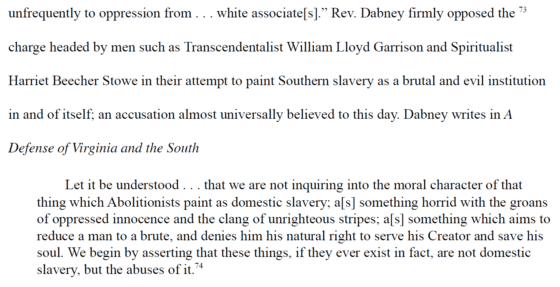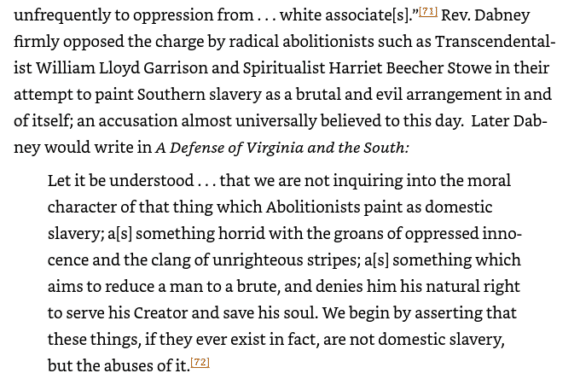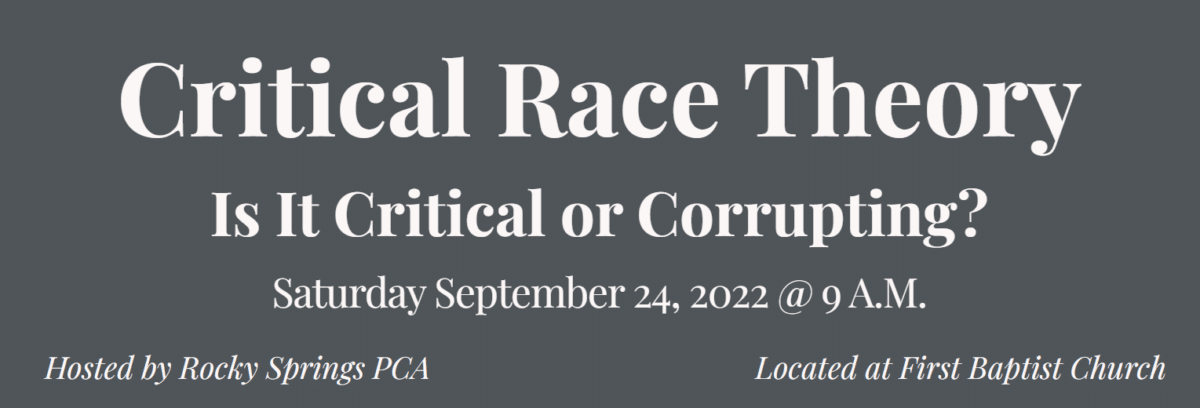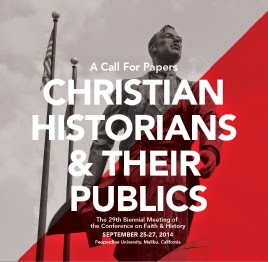UPDATE (7/28) – Jon Harris announced today on his podcast that he will not be able to speak at the CRT conference due to a memorial service for a family member scheduled on the same weekend. I continue to hope that the organizers will reconsider having this conference.
UPDATE (8/12) – I was informed by Andy Frey, pastor of First Baptist Church, Grove City, that their church will not host the CRT conference described in this post. I reached to pastor Frey and informed him of the issues raise in this post as well as some new ones which have come up. He was unaware of what I raised and took the matter to his deacons. At their regular deacons meeting, the vote unanimous to pull out of participation.
…………………… (original post)
In September of this year, Rocky Springs Presbyterian Church (Harrisville, PA) plans to host a conference on critical race theory at the First Baptist Church in Grove City, PA. Given the speaker lineup, I don’t expect a fair treatment of CRT. I once attended First Baptist and hate to see it used as a site for a politicized show like this.
In any event, the main reason I write about the conference isn’t that more anti-CRT is coming to my town. I have yet to write about the fiasco that happened at my college over CRT. I do hope to visit aspects of that issue sometime soon.
The biggest problem I see is the platforming of Lost Cause advocate Jon Harris. Harris and his apparent alter identity “Joseph Jay” are full throated supporters of the Confederacy. According to Harris, the South had the moral high ground in the Civil War (or War Between the States as he calls it). Lost Cause history and theology view the South as the virtuous side which fought for traditional Christian values. The horrors of slavery are minimized and abolitionists are dismissed as liberals and atheists.

Blogger Bradly Mason did a thorough run down of Harris’ support for the Confederacy and the Lost Cause version of history in this Twitter thread. I will pick out a few items here, but if interested, you can get the full effect by consulting Mason’s thread and following the links he provides. A curious aspect to Harris’ support for the Confederacy is an apparent double life as a “Professor Joseph Jay.” Mason documents the details in the thread, but here is a summary.
Sacred Conviction
In 2011, Harris wrote a paper for The Master’s Seminary titled: “Sacred Conviction: Biblical Authority and the Road to War in Antebellum America.” This paper is a thorough defense of the South as defender of Christianity and a rejection of what Harris casts as the ungodly North. The title of the first chapter is: “All [Northern] Ground is Sinking Sand.” On the first page, Harris lets Presbyterian minister and staunch defender of slavery James Henry Thornwell speak for him with this quote about the North and South in the Civil War:
In one word, the world is the battle-ground – Christianity and Atheism the combatants; and the progress of humanity the stake.
Harris initially denied it, but according to Mason, he later admitted that he wrote the paper. The Master’s Seminary professor Nathan Busenitz acknowledged that Harris attended the seminary briefly at the time the paper was written. Busenitz added that he was prohibited from disclosing Harris’ grade due to privacy laws. This same paper was then later published by Lost Cause publisher Shotwell Publishing in 2018 under the name of Joseph Jay. When the two documents are compared, they are indeed the same paper. Chapter headings are the same and the content is the same, word for word.
Either Joseph Jay plagiarized Harris’ work, or Harris published the paper under the pseudonym Joseph Jay. The latter seems likely since Harris recommends the book on his website. It gets more bizarre. On a Lost Cause radio show hosted by Confederate sympathizer Ed DeVries, Harris was interviewed as Professor Joseph Jay. So a lame pseudonym wasn’t enough, he had to impersonate a professor and move on to academic fraud.
The paper is revisionist history of slavery and the Civil War. According to Harris, a few quotes from Lost Cause historians telling us that the war wasn’t about slavery is supposed to prove his point. Harris fails to mention the statements of the slave states about why they seceded. He also fails to mention the Cornerstone speech of Alexander Stephens, Vice President of the Confederate States of America.
Our new government is founded upon exactly the opposite idea; its foundations are laid, its corner-stone rests, upon the great truth that the negro is not equal to the white man; that slavery subordination to the superior race is his natural and normal condition. This, our new government, is the first, in the history of the world, based upon this great physical, philosophical, and moral truth. This truth has been slow in the process of its development, like all other truths in the various departments of science. It has been so even amongst us. Many who hear me, perhaps, can recollect well, that this truth was not generally admitted, even within their day. The errors of the past generation still clung to many as late as twenty years ago. Those at the North, who still cling to these errors, with a zeal above knowledge, we justly denominate fanatics. All fanaticism springs from an aberration of the mind from a defect in reasoning. It is a species of insanity. One of the most striking characteristics of insanity, in many instances, is forming correct conclusions from fancied or erroneous premises; so with the anti-slavery fanatics.
Harris/Jay also tells us that slavery wasn’t so bad. He/They side with Southern Presbyterian and slavery defender Robert Lewis Dabney (Note below that the paper and the book are almost identical).
First, a section from The Master’s Seminary paper: Now, the same passage from “Joseph Jay’s” book:
Now, the same passage from “Joseph Jay’s” book:
Throughout the paper and book, Harris tells us the Confederacy was the noble cause and slavery was not that bad. Perhaps, he advises, it was even beneficial if you consider the spread of Christianity among the slaves.
At heart, the Lost Cause position is a denial of history and appears to be a denial of racism. This is a powerful deception for many White people. In my opinion, CRT hysteria among White evangelicals is a current symptom of this problem. In the face of the horror that is America’s racial history, I suppose it is natural to want to raise up psychological defenses. However, we cannot live in denial and walk in the light.
I certainly hope the two churches will consider canceling the workshop. If ever there was a town where CRT is not being taught in the schools, it would be Grove City. All a workshop like this will do is spread misinformation and create suspicion and division in the community. And certainly, we do not need any Lost Cause nonsense here or anywhere.
Related Information:
A slave experience of being sold South
Conditions of antebellum slavery
Interview with former slave Fountain Hughes
In Getting Jefferson Right, Michael Coulter and I include a chapter on Jefferson and slavery. Although Jefferson wasn’t the worst master, he allowed his task masters to treat slaves cruelly. He paid slave catchers to pursue runaway slaves, and he refused to provide freedom for his slaves when Virginia slave laws allowed it.
UPDATE (7/26): Despite being defended in an email by the conference organizer, Harris is now missing from the trio of speakers on the conference website.
I still hope the whole conference is scratched. Grove City is a small, mostly White town. My impression, based mostly on the reports of my children over the years, is that there is notable racism in the schools among students. Bringing in people who associate any efforts at racial equality with CRT and Marxism will only heighten negative stereotypes and prejudices. If anything, Rocky Springs and First Baptist should offer an anti-racism conference.
What a difference it would make if the PCA and Baptist churches would team up to repent of racism in the history of both denominations. Specifically, the PCA exists due to slavery and segregation. Tobin Grant lays it out in a 2016 article:
The PCA was primarily made up of churches who had opposed integration and civil rights. Its leaders openly stated that they were continuing the legacy of confederate churches. As in 1861, the PCA was going to keep the faith pure and free from liberalism.
Most of the PCA was in the deep south. A majority of Mississippi’s churches joined the PCA, giving it the greatest share of PCA’s congregations.
The narrative most commonly heard in PCA churches is that it formed to protect and keep the faith and avoid the slide into liberalism. But this is akin to the belief that the south seceded because of states rights: the southern states claimed they had a right to make their own laws, but they made this claim only because they were on the verge of losing slavery Likewise, the PCA formed to avoid liberalism, but this liberalism was defined as support for integration and racial equality.
Rather than host a conference criticizing anti-racism efforts, I think a PCA church might want to spend more time learning than teaching, repenting than condemning.


